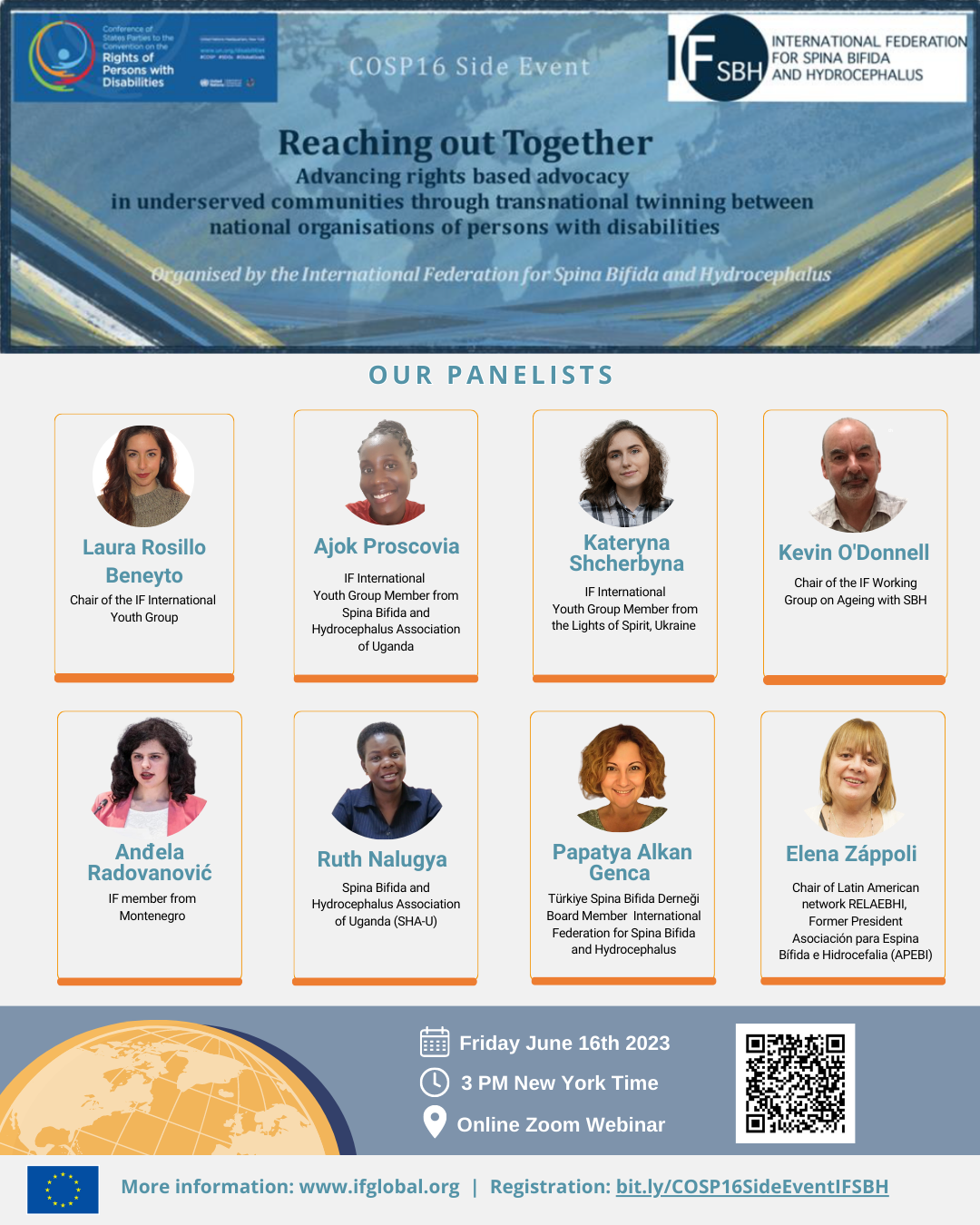COSP16 SIDE-EVENT SUCCESFULLY REACHED OUT TOGETHER

COSP16 SIDE EVENT REACHING OUT TOGETHER: ADVANCING RIGHTS BASED ADVOCACY IN UNDERSERVED COMMUNITIES THROUGH TRANSNATIONAL TWINNING BETWEEN NATIONAL ORGANISATIONS OF PERSONS WITH DISABILITIES
On June 16, 2023, IF hosted a significant side event during 16th Conference of States Parties to the Convention on Rights of Persons with Disabilities (COSP16) titled ‘Reaching Out Together: Advancing Rights-Based Advocacy in Underserved Communities through Transnational Twinning’. This event highlighted the vital role of capacity building initiatives for persons with disabilities and their organisations in underserved communities. Focusing on transnational twinning, it empowered national spina bifida and hydrocephalus (SBH) associations and their members for inclusive participation in policy-making processes. The event also advanced rights-based advocacy for pressing issues within the global SBH community and inspired capacity building efforts for underrepresented disability groups worldwide.

This dynamic COSP16 side event, guided by moderator Dr. Sylvia Roozen – Secretary General of IF featured six informative sections that enriched the panel with valuable insights and expertise.
- Words of Welcome by Cato Lie & Dr. Sylvia Roozen
- Youth Leading by Example including Ajok Proscovia, Kateryna Shcherbyna &Laura Rosillo Beneyto
- Advancing Disability Rights by Promoting a Person-centred and Human Rights-based Approach by Kevin O’Donnell & Anđela Radovanović
- National Advocacy influencing Global Actions by Papatya Alkan Genca
- Discussing other Examples of Reaching Out Together by Ruth Nalugya, Elena Záppoli, Dr. Rezina Hamid, Abdus Sattar Dulal & Spina Bifida Foundation India
- Closing Remarks
The event commenced with a powerful address by Cato Lie (President of IF) at the United Nations Headquarters in New York, emphasising the urgent need to prioritise the rights of individuals with SBH. He stated, “Only through diversity and inclusion can we effectively address the needs of all individuals”. IF President called for improved access to healthcare, support services, and active involvement in decision-making processes. He urged Member States to integrate the United Nations Convention on the Rights of Persons with Disabilities (UNCRPD) principles, support capacity building initiatives, and embrace diversity within the disability community to address the unique requirements of each individual. In addition, Dr. Sylvia Roozen highlighted the core principle of the CRPD. She stated, “With a focus on capacity building and strengthening participation across different demographics, today’s meeting aims to facilitate exchanges of lessons learned between national associations and their members”.


In the second session, Ajok Proscovia (IF International Youth Group Member from Spina Bifida and Spina Bifida and Hydrocephalus Association of Uganda) and Kateryna Shcherbyna (IF International Youth Group Member from the Lights of Spirit, Ukraine) discussed the challenges and empowerment initiatives for youth with SBH in different countries. Ajok shared empowering initiatives in Uganda, while Kateryna shed light on difficulties faced in Ukraine. Both speakers emphasised the need for improved support systems and inclusive measures to enhance the quality of life for individuals with SBH. The Chair of the IF International Youth Group SBH, Laura Rosillo Beneyto, highlighted their work on independent living, providing a safe space for young individuals with SBH to share experiences, address challenges, and advocate for their rights. The group actively engages in policy advocacy, raises awareness, and promotes the talents of young people with SBH.

Led by Kevin O’Donnell (chair of the IF Working Group on Ageing with SBH) and Anđela Radovanović (IF member from Montenegro) the third session revolved around the involvement of people with disabilities in national discussions, addressing misconceptions and stigmas related to the ageing SBH community, and highlighting resources and support for healthcare, independence, and social inclusion.
In the fourth session, Papatya Alkan Genca (IF board member and representative of the Türkiye Spina Bifida Derneği) emphasised the significance of the recently passed WHA76.19 Resolution. She highlighted the importance of collaboration and food fortification in reducing the risk of spina bifida and other health conditions.
During the fifth session, Ruth Nalugya from the Spina Bifida and Hydrocephalus Association of Uganda (SHA-U) emphasised the importance of food fortification programs in addressing micronutrient deficiencies, advocating for increased consumer awareness, monitoring capacity, and equitable access to fortified food. Later on, Elena Záppoli (chair of the Latin American network RELAEBHI and Former President of Asociación para Espina Bífida e Hidrocefalia) underscored the significance of networking in fostering inclusive societies and advancing inclusive health, highlighting the establishment of the Latin American network in 2012 with the aim of improving the lives of individuals with SBH and their families. Dr. Rezina Hamid from Bangladesh Spina Bifida and Hydrocephalus Welfare Trust raised awareness about the neglect of children with SBH in the country’s healthcare system and government policies. Additionally, sir Abdus Sattar Dulal of the Bangladesh Protibandhi Kallyan Somity (BPKS), shared how their association is led by representatives of persons with disabilities and reached 43 out of 64 districts in Bangladesh, resulting in significantly improving the lives of millions of persons with disability in Bangladesh. The association works on national policies including the UNCRPD, access to facilities, humanitarian support, public service, and increasing the knowledge of persons with disabilities of more than half a million stakeholders and professionals. Throughout our virtual event, we were delighted to feature an impressive dance performance by youth members from the Spina Bifida Foundation India, showcasing the power of artistic expression in promoting inclusivity and celebrating the abilities of individuals with SBH.

Overall, the side event ‘Reaching Out Together: Advancing Rights-Based Advocacy in Underserved Communities through Transnational Twinning’ hosted by the International Federation for Spina Bifida and Hydrocephalus during COSP16 was a significant gathering that emphasised the importance of capacity building and transnational collaboration. The event addressed various topics, including youth empowerment, disability rights advocacy, international resolutions, support for the ageing community, and food fortification programs. It concluded with a focus on the role of networking in creating inclusive societies and promoting inclusive health. The event served as a platform for knowledge exchange, collaboration, and inspiring efforts to empower underrepresented disability groups and address the unique needs of the communities worldwide.
You can re-watch the COSP16 Side Event here: https://youtu.be/emB9PQrJXRo

